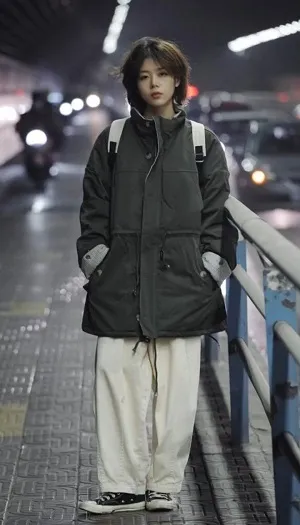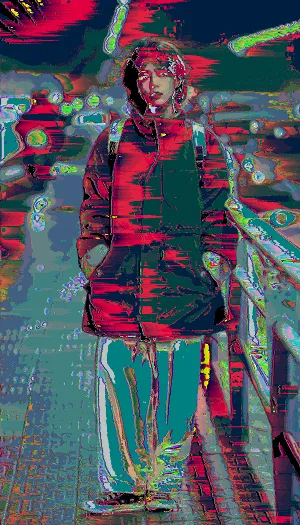2026-03-05 12:41:59
We are simply not meant to be mindless consumers; we are meant to be creators .
Hear me out.
You may think, "But how do we create without consuming anything?"
The point I'm trying to make is not that you should stop consuming completely, but you should stop simply 'consuming' for the sake of consuming. Think about it: you watch an interesting movie, you have a lot to talk about it , you discuss what was wrong and what went right with the movie, you can even write a little journal entry to express your feelings , and that's you engaging with the content.
Now think of a boring movie: you have nothing to think about it. You watched it, but it didn't satisfy your hunger, and now you're onto consuming the next movie. Simply consuming doesn't give us satisfaction unless we create. I mean , look at the short-form content: designed to be consumed endlessly and keep you away from creating.
So pick up a pen, write an essay or type it out, draw something-anything, even cave paintings. But enjoy the process of creating. Life is too short to only consume and not create.
2026-03-05 11:05:25
It's March 4th, which my high school teacher observed is the only day of the year that is a directive. We're two months into the new year, and whether or not each of us has stuck with our intentions for 2026 so far—whether the feedback from the universe with respect to our life has been fair or not—we must march forth.
This isn't easy and I know on most days it feels hopeless. This past few days has not been kind to my mental health. (Hint: the Wikipedia article for World War III updated its section on potential flashpoints).
Still, I have it in me to shake things up. The Stoics taught that it's important to distinguish between what is within our control and what is not. I ask myself, what can I do? Besides doomscrolling and wallowing in pessimism and nihilism? Such questions call to my mind that quote, "be the change you want to see in the world." Which is a more poetic way of saying no one is coming to save me, so it's time to roll up my sleeves and do something meaningfully. Otherwise I'm reinforcing learned helplessness.
Growing up with stories of superheroes and anime protagonists and knights of chivalry honed in me a desire to save the world. There is still a part of me that believes I can do some good. Perhaps it's naive of me, and I'm no stranger to feeling frustrated and alone and discouraged, but I'm simply that kind of stubborn. What I've learned is to be realistic with what I can do, influence, affect, effect.
Well, it's been three months since I started this blog and it's actually the longest time I've gone in sustaining one. However, by now I've probably said all that I want to say in terms of expressing myself. I'm a proponent of simple living—I don't know how many different times I can write about that topic.
And then when I peak at what's trending on this site, I see that it's not just me. There's a non-zero number of writers who write about the same thing over and over, as if Shakespeare's Dogberry were given a digital platform. At some point, it becomes more noise than signal, because nothing substantive is being offered. Using myself as a case study, I posit that writing about the same topic from a different angle is an instance of "this time it'll be different and the change I really want to enact in my life will start as soon as I publish this iteration of my foregone conclusion." It feels good in the moment and takes little effort (indeed, the effort required diminishes over time as a byproduct of practice), but if more people did this, then it crowds out trending and perusing blogs becomes dull.
This isn't me calling anyone boring. I remember a post a while ago in which the author called the other users boring, as if the author was entitled to entertainment. That left a bad taste in my mouth. Nor am I calling anyone to be more interesting. I seem to recall some discourse around performativity on this platform; the idea that we encourage others to keep being creative and sharing the good stuff (which is a variant of the first issue, in that some users are asking others to keep the stream of content flowing so that they have a sustainable source of content to devour, presumably to distract from other things going on in their life.)
This is really me describing the change I want to see, in order that I may become that change. I want to see more intertextuality, which is the nerdy way of saying text that relates to other texts, dissolving the isolation between posts. To repeat: I think I've said all I mean to say in my first three months of posting, but the practice of writing has been good for my soul. Every minute I spend thinking about how to string my thoughts together is one less minute doomscrolling. The solution I'm eager to implement, then, is writing in response to what others share. Blogging can often feel like yelling into the ether; this I know. I also know there's a joy in getting a response from a reader. All my thoughts in this post point to this idea of stepping outside my own thoughts to be more in communication and community with the people on this platform.
Let's give this intention a shot.
2026-03-05 10:36:28
I use a lot of public domain art, but recently I've been thinking about cyberpunk, so art from the 1700's doesn't feel quite appropriate.
Modern images aren't quite right either, skylines and streetwear are great, but we need some cyberpunk edge. I want something that has a techy touch and looks not quite right. Something glitchy!
So I thought about glitch art, something I haven't done since college!
Glitch art is basically about doing stuff with files that you aren't meant to, to create interesting visual effects. There's lots of ways to do it, but I've been messing around with Databending.
Databending is done by loading an image into a software it isn't meant to go in, and then editing it in that software. In my case, I loaded images into audacity, added audio effects, and then exported them as images, here's what one looked like before and after.




2026-03-04 21:24:00
I read this great quote shared by Prasatt:
Be more generous than necessary. No one on their deathbed has ever regretted giving too much away. There is no point to being the richest person in the cemetery. Kevin Kelly
I love it. It’s so true, just like the saying, “always be a little kinder than necessary.”
Costs nothing, means everything. A precious gift for both the giver and the receiver. Something no money can buy.
I also think generosity is an important aspect of personal blogging. Not that everything needs to be free. If you feel like adding a “Buy me a coffee” button, or want to try other ways to make a few bucks, go for it. Give it a try.
But first, you really need to be honest with yourself about the intent.
If the answer even slightly leans toward the latter, don’t do it. You will get disappointed.
“I offer all this for free and people don’t even think it’s worth a cup of coffee. Why even bother continuing?”
You'll end up quitting blogging for the wrong reasons. Or maybe you started blogging for the wrong ones.
I have a full-time job. I would love to work 75 percent and spend more time blogging, but my salary won’t allow it. I could try asking my readers to support me, I even get the question sometimes, but don't dare do it.
I’m afraid it would lead to me getting “clever” about blogging. I’m afraid it would turn passion into pressure.
That's my two cents (which is 100% more than I earn from blogging).
2026-03-04 12:41:00
og post: https://spice.bearblog.dev/on-being-talentless/
Keep in mind I am just a random stranger from the Bearoverse who subscribes to her blog, and by all accounts I am someone whose opinion can easily be disregarded. But her words landed hard with me this evening.
Reading this felt like looking at something lifted straight out of a very old LiveJournal post of mine from twenty years ago. Because of that, I felt compelled to respond. I could be completely wrong about all of this, of course.
I strongly suspect this response would exceed the character count of most guestbook platforms, so I am posting it here in the hope that Tuesday happens to see it.
Feeling average can hurt, especially if you grew up surrounded by people who seem naturally exceptional. I know that feeling well.
My father is a very talented woodworker. My sister is an absolute angel with stained glass. My mom paints with this delicate precision that still amazes me. Meanwhile I have been doing photography for years and still second-guess simple operations all the time. Things someone “at my experience level” probably should not hesitate over anymore.
For a long time that made me feel like maybe I was just the mediocre one in the lineup.
What time eventually teaches you, especially once you spend enough years in the professional world, is that a huge percentage of people are simply winging it. They have been winging it long enough that it starts to look like confidence or talent from the outside.
There is also a strange hierarchy that forms around skills and professions where things are made to look more exclusive, more mystical, more “elite” than they really are. A lot of it quietly signals to others to stay out of the room. But once you have been around long enough, you start noticing how much of that structure is just smoke and mirrors.
One small thing I noticed while reading Tuesday's post is that it is thoughtful, structured, and honest in a way that a lot of writing on the internet simply is not. That may not feel like a talent from the inside, but from the outside it certainly reads like one.
The irony is that the people who worry about being average are usually the ones paying the closest attention to their own shortcomings. That self-awareness can feel painful, but it is often the same thing that eventually leads someone to develop real depth in whatever they do.
So feeling average is not necessarily evidence that you are. Sometimes it is simply evidence that you are paying attention. ■
🎧 Natalie Walker - Mars via Lush on SomaFM
2026-03-04 09:18:00
After a nearly 20 year run, I have deleted the last of my social media accounts. I dabbled in MySpace a bit early in my early teens, but really started in earnest with Facebook my senior year in high school when I received my college email address (back then FB required a .edu to create an account). At first, it was fun to friend new people I met at college parties, post funny statuses, and "poke" the cute girls (ask your parents, kids).
I was a bit late to the Instagram party and joined around 2013. That too was fun at the start. I worked in the service industry, so I used the app as a way to find the cool new bars and restaurants, or post updates about what I was doing at my coffee shop. I got a real sense of community out of those interactions over shared interests, and the early creators were fun to watch grow. Online personas weren't a business yet, it was just people having fun posting about cool stuff in their lives.
Over the next few years I watched from a distance as other platforms would pop up and fizzle out (RIP, Vine), or blow up into the propaganda juggernauts we know them as today (Twitter, Reddit). I never took my posting seriously, or had delusions of making money off it, but I enjoyed seeing what other people had to share.
During all this time, accounts turned into personal brands for some and engagement became the commodity. Posts became formulaic in an attempt to ride the algorithm. It got shitty. Plenty of post-mortems have been written about the death of social media and I'm not here to add to the heap. This post is merely my own autobiographical eulogy for my own social media days.
At the end of 2024 I dumped Instagram and Facebook, after not really using either for a few years. I had a Twitter, but never posted or read anything on it and deleted it ages ago. I made the jump to the Fediverse through Mastodon and Pixelfed, but microblogging just isn't my jam, and posting my photos on an app just doesn't butter my biscuit anymore. I don't want to read or write sub-500 character takes on the state of whatever, and glancing at someone's photos for a fraction of a second as they fly by with the help of my finger by isn't fulfilling. Now, I realize these are "me" problems and not problems with the platforms themselves, but I think that gets to the heart of why I'm dumping social media.
What I want from the internet has changed.
I realize that social media is not the entire internet, but it does make up a large part of how I interact with the internet. On microblog platforms, nearly every post is an argument for or against something. I find it mentally exhausting, yet I willingly invite those opinions into my life through the glowing portal I carry in my pocket. On photo-sharing apps, it's difficult for me to build an appreciation for the art I see when it's the size of a playing card in my hand. I take all of the amazing creativity I see for granted because it's right there at my beck and call. Neither of these scenarios, I feel, are adding value to my life experiences and, ultimately, that value is what I want from the internet.
I also can't deny the fact that I have changed quite a bit as a person. Through nearly a decade of sobriety and almost four years of therapy, I'm finding internal validation rather than seeking it from other people. I've done a lot of work on myself and like the person I've become. Social media just doesn't add to or enhance those positive feelings for me anymore like it used to, which is OK. I existed and thrived before I had social media accounts, and I will exist and thrive now that I don't have them anymore. I look forward to exploring new (to me) corners of the internet, learning new skills, and engaging with people through places like Bear.
And, if you still have social media and are enjoying it, good on you! We need more things that bring us joy in these uncertain times.
:)